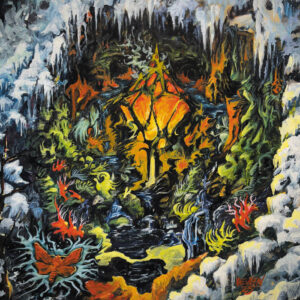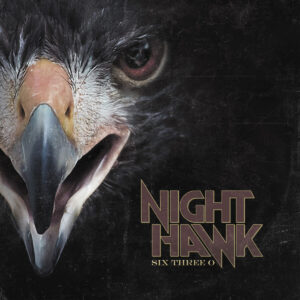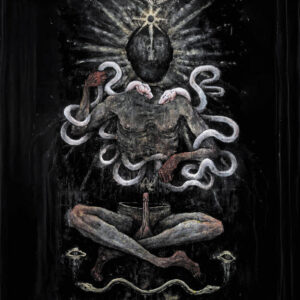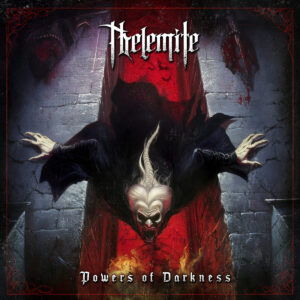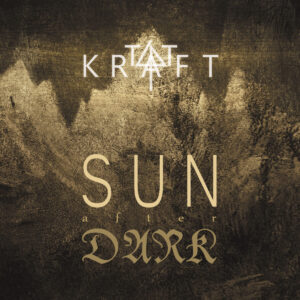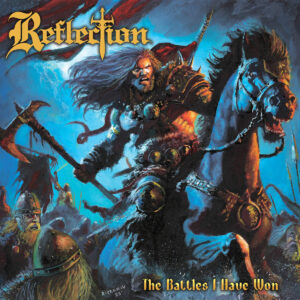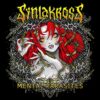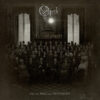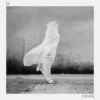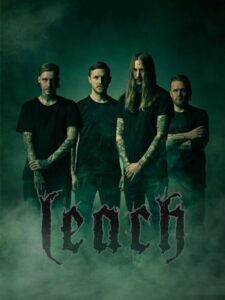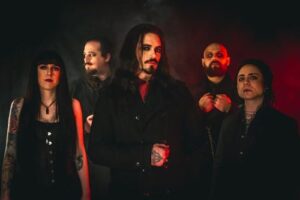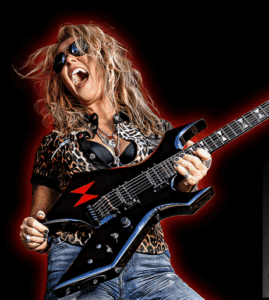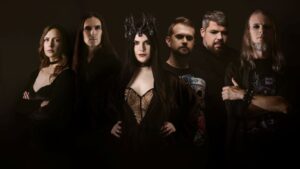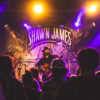Roibeard O Bogail
Mael Mordha
MAEL MORDHA – the Gaelic Doom Metal act – has just released a new CD entitled "Manannan" and this was some good timing to come in contact with Roibeard O Bogail (the voice and the mastermind of the band) and ask him a few questions regarding this new album plus some general info about their future plans. Here's what he had to say.
By Maria Voutiriadou
•
July 3, 2010
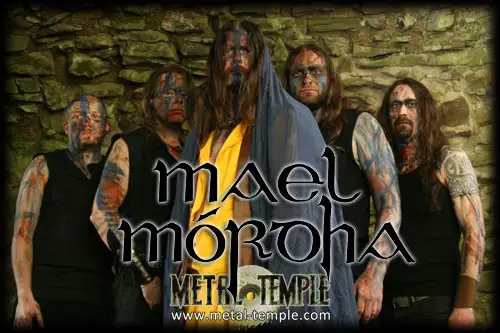
Also read: MAEL MORDHA - "Manannán" review
Hello Rob, great to welcome you again, although it's the first time for METAL-TEMPLE.COM to have you in our Metal company! We have changed a couple of e-mails after your visit in Greece, 2 years ago, supporting PRIMORDIAL, and it was about my live report for that concert, if you remember. How are you?
Geia Sou Maria. Poli Kala ime. (In Greek and is translated to: Hello Maria, I'm fine)
First of all, congratulations on the new MAEL MORDHA album; I believe that "Manannán" is a worthy holdover of the glorious MAEL MORDHA past, bringing a new air in your music. Would you like to tell us few words about "Manannán"? How came the inspiration and which are the main differences comparing to MAEL MORDHA previous works?
Glad you liked it. I suppose first off, it was written in a much shorter space of time than the previous albums and was the first time that all the current members of the band were involved in the writing/ arranging of the songs. There were no old songs on this one which was very much not the case on the other two, and no pianos or keyboards on this one either as all the songs were very much guitar based. With regards the inspiration for this one, it was a direct follow-on from the last one. That ended with the death of MAEL MORDHA whereas this one tells the story of the journey of his spirit to the Otherworld realm of Manannán Mac Lír, an Irish sea god.
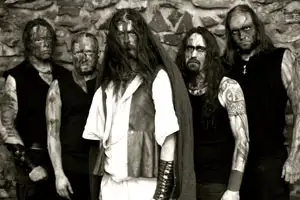
Three years have passed since your previous studio album. Do you think that "Manannán" is the logical continuation of "Gealtacht Mael Mordha"?
Well, yes and no. The lyrics, most definitely yes, however as about half of "Gealtacht Mael Mórdha" was made up of older songs they are a little at odds with the music on "Manannán",however, if you take the other half of the songs and compare them to what's on "Manannán",then I think yes, very logical.
What is in your point of view the biggest difference between this album and the two former ones?
This one, for me, sounds more like an album while the other two were more like a "best of". I think that is all down to the writing process as I mentioned before.
Can you tell us a few words about the lyrical content of "Manannán"? I recognize a more epic, warlike style in your compositions; is this true and if yes, why you wanted to succeed this? Which are the messages you want to pass to the audience via this album?
Well, it is following the journey of the spirit of Mael Mórdha (the man not the band) to the realm of Manannán. During that time, he figures out that he is dead, where he has gone and ultimately that he is the son of Manannán, whose primary role is to punish the Irish when we step out of line. I didn't actually think there was much of a warlike theme to the whole thing as it was supposed to be a kind of spiritual journey but I suppose there are quite a few passages (the end part of "The Doom of the Races of Éire" does tend to spring to mind as an example) that are of a more warlike nature. The one thing I always like about bands like ours is that the lyrics always tend to have more than one meaning, and so it becomes more personal for the listener that way, as they reach their own conclusions as to what the lyrics are about. I don't think "Manannán" is any different in that regard. There is the basic plot as I described before, but like all old Gaelic Irish poetry, many of these ancient images are metaphors for what we are experiencing/ have experienced in our own lives making things very relevant to the people of today.
I remember the first time I was listening to "The Doom Of The Races Of Eire" in your live performance in Greece, 2 years ago and I really enjoyed. In my opinion, this song has left its own mark in the album. Tell us the story behind this track.
It was the first one we wrote for this album and had become a staple of our live set before we had even recorded it. It tells the thoughts of Mael Mórdha/ Mongán as he rejoices his good fortune of arriving in such a wonderful place as Eamhain Abhlach, recalls how often he has been here before and remembers the times past that he has traveled to Éire in the form of various almost villainous figures of Irish Mythology and History.
What are your main influences as a band?
As a band nowadays I would say nothing (or everything) but in the beginning it was very much as a result of the Northern English Doom/ Death scene which was responsible for the band starting off. That coupled with the musical culture which we are surrounded by here, even if that be only subconsciously seeping into our collective brains a lot of the time.
What is the meaning of 'Gaelic Doom Metal'? What are the differences comparing to the 'Doom Metal' we know?
Originally, the term was used by us to describe the mix of old Gaelic Irish laments and elegies (which tend to be miserable at the best of times) with Doom/ Death Metal, but the band has changed a bit in its approach over the years and so I think the style of Doom has changed too. Many people are now comparing some of the music to bands like CANDLEMASS as opposed to MY DYING BRIDE as they might have in earlier years but there are many other things happening in their also. The singing in many places and the whistle, when it makes an appearance, is a lot more rooted in the Gaelic ways of singing than would be found in other forms of Doom. This tends to influence the way the song are written, as the singing and music are supposed to compliment each other, which I think they largely do.
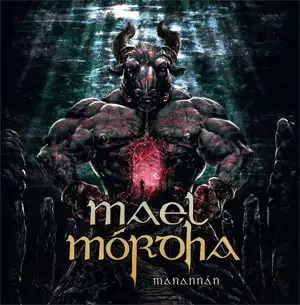
How important is Gaelic language in your life? Do you speak Gaelic sometimes in your everyday life or is it more a way to express better your music anxieties?
I speak Irish with my sons in the hope that they will get the grounding in the language that most of us in Ireland don't get (myself included). It is not my first language though. We are lucky now though as we do have one Irish Language television station which was not there when I was a child so that all helps (many of their programmes are far better than any of the English Language ones and so making it very interesting to watch) and I hope they will pick up more from that too. Mammy is Greek though so they may end up being tri-lingual, or else very confused!
Have you ever thought of writing lyrics for an album in the Gaelic language exclusively and how easy would be that?
I Have thought about it many times and have written a few songs in Irish. It doesn't do the language justice though as much of the Irish poetry is very complex and beautiful whereas mine is uneducated and crude. I have discussed it with a few friends who are fluent Irish speakers about them helping me express in a better fashion what I am trying to say but I think that will not be for MAEL MORDHA. I always liked the way RHAPSODY did it, adding in a line or two of Italian here and there and so I have done that with the Irish and will continue to do so. It is very difficult for non-english speaking/ singing bands to reach people outside their native lands as no-one will know what they are saying, so English will stay the dominant, but not exclusive, tongue for MAEL MORDHA.
Do you believe that is hard for a new listener to follow your music style and love MAEL MORDHA because of your unique self-identity? Or this uniqueness makes MAEL MORDHA more lovesome to the audience?
I am wondering why you asked ? Maybe you can tell me what you have experienced when discussing MAEL MORDHA with your friends/ readers in Greece later? I'll deal with this album and its reactions so far. I think it is well played and recorded but it still gets mixed reactions. People either love it or take a severe dislike to it mainly due to the vocals, sometimes it's my voice and sometimes the way I sing. There have been some criticism of the other musical aspects of the album as well but vocals are the main one. I think maybe certain people have an idea that we are a Doom band or a Folk band or some other kind of band and therefore demand that we play to fit into this narrow box they think we should fit into. When that doesn't happen they get hostile towards what we do, which I find a little strange. So, to answer your question, both.
Are there any plans to tour to support the new album, except your participation in the upcoming festivals in Austria and Netherlands, the forthcoming fall?
A lot of things in the pipeline at the moment but I can't mention them until they are confirmed. We have a gig in Madrid the week before the one in Austria as well, as one in Dublin on the 25th of September too, but there'll be more. Keep checking our website.
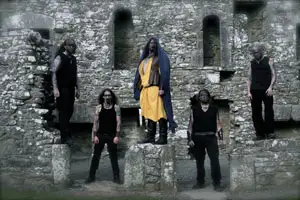
What does it mean to MAEL MORDHA a live performance? I've watched you in that live show in Greece supporting PRIMORDIAL and I left speechless! You are quite energetic on stage and the crowd seems to regard this. How important is to you the success of a live show?
Well, it's what any musician loves the most (or should do anyway), playing your music in front of an appreciative crowd who are there to enjoy themselves. I think it's one of those few times in human societies where people are freely giving of their energy both performers and audience, where the energy bounces from the audience to the performers who multiply it and send it back. Anyone who is lucky enough to be at such a performance has a natural high leaving the venue which is great. We've been at this for a long time and it's hard to beat the feeling of the connection between crowd and band.
Do you consider yourselves a 'studio band' or a 'live' one?
I'd like to think that we are both. Possibly a better live band at the moment, but we are slowly catching up with our studio efforts too!
Are you going to shoot any video clips for the new album?
There's a few bits n' pieces being worked on at the moment. When they see the light of day, we'll send some stuff on to TV War so that ye can see us in the Greek TV.
What are the plans for the near future? What's coming next, after "Manannán"? Or it's too early to talk about it?
Oh, not at all. After all "Manannán" was completely finished and at our label last August. Things on the playing front are quiet at the moment so we are writing the next album as we speak. All I can say so far is that it will be another concept and continuation on from the last one (reincarnation is great).
Rob, thank you for your time! Congratulations on the excellent new album for one more time. I wish you and the band all the best! Feel free to add anything you want… Slan agus Beannacht.
Hopefully we'll see ye all again at the start of next year. Euxaristw Poli, Ta Leme (In Greek and is translated to Thank you very much and we'll keep in touch)
More results...
Latest Interviews
All 2126 Interviews
